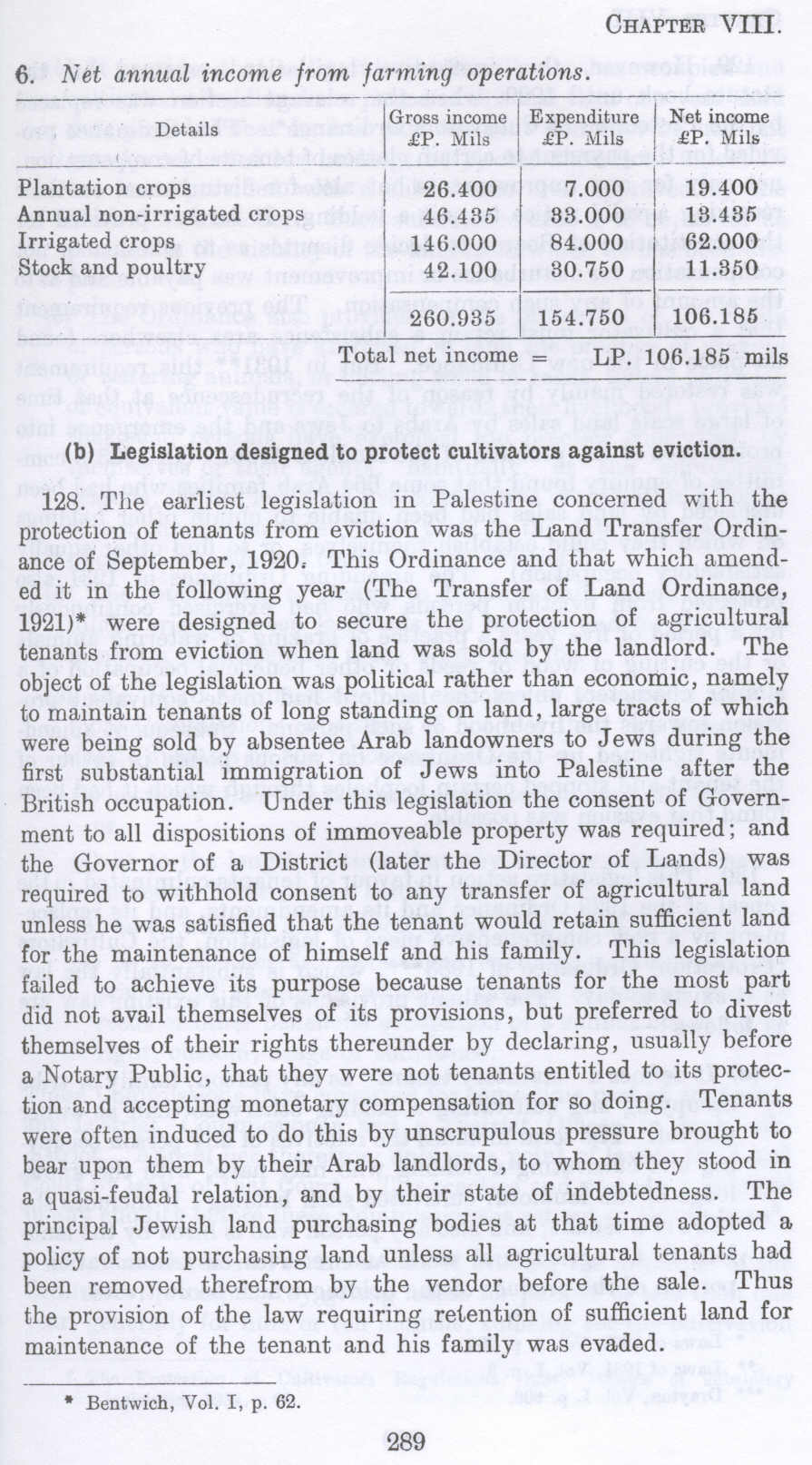| Prev | Next |  |
| Prev | Next |
| PalestineRemembered | About Us | Oral History | العربية | |
| Pictures | Zionist FAQs | Haavara | Maps | |
| Search |
| Camps |
| Districts |
| Acre |
| Baysan |
| Beersheba |
| Bethlehem |
| Gaza |
| Haifa |
| Hebron |
| Jaffa |
| Jericho |
| Jerusalem |
| Jinin |
| Nablus |
| Nazareth |
| Ramallah |
| al-Ramla |
| Safad |
| Tiberias |
| Tulkarm |
| Donate |
| Contact |
| Profile |
| Videos |
Legislation designed to protect cultivators against eviction in Palestine before 1948 (Nakba), British Mandate: A Survey of Palestine: Volume I - Page 289. Section 8: Administrative Problems Regarding to State Holdings : Net annual income from farming operations. (b) |
Disclaimer
The above documents, article, interviews, movies, podcasts, or stories reflects solely the research and opinions of its authors. PalestineRemembered.com makes its best effort to validate its contents.


Post Your Comment
*It should be NOTED that your email address won't be shared, and all communications between members will be routed via the website's mail server.
6. Net annual income from farming operations.
Details I Gross income Expenditure
£P. Mils £P. :Mils .£P. Mils
--- --- I -----
Plantation crops 26.400 7.000 19.400
Annual non-irrigated crops 46.485 83.000 18.431i
Irrigated crops 146.000 84.000 62.000
Stock and poultry 42.100 30.750 11.350
-
260.935 154.750 106.185
----- Total net income =
LP. 106.185 ;mils
(b) Legislation designed to protect cultivators against eviction.
128. The earliest legislation in Palestine concerned with the protection of tenants from eviction was the Land Transfer Ordinance of September, 1920, This Ordinance and that which amended it in the following year (The Transfer of Land Ordinance, 1921)* were designed to secure the protection of agricultural tenants from eviction when land was sold by the landlord. The object of the legislation was political rather than economic, namely to maintain tenants of long standing on land, large tracts of which were being sold by absentee Arab landowners to Jews during the first substantial immigration of Jews into Palestine after the British occupation. Under this legislation the consent of Government to all dispositions of immoveable property was required; and the Governor of a District (later the Director of Lands) was required to withhold consent to any transfer of agricultural land unless he was satisfied that the tenant would retain sufficient land for the maintenance of himself and his family. This legislation failed to achieve its purpose because tenants for the most part did not avail themselves of its provisions, but preferred to divest themselves of their rights thereunder by declaring, usually before a Notary Public, that they were not tenants entitled to its protection and accepting monetary compensation for so doing. Tenants were often induced to do tills by unscrupulous pressure brought to bear upon them by their Arab landlords, to whom they stood in a quasi-feudal relation, and by their state of indebtedness. The principal Jewish land purchasing bodies at that time adopted a policy of not purchasing land unless all agricultural tenants had been removed therefrom by the vendor before the sale. Thus the provision of the law requiring retention of sufficient land for maintenance of the tenant and Ills family was evaded.
_______________________________________
* Bentwich, Vol. I, p. 62.
Page 289